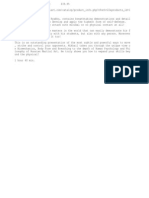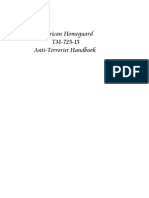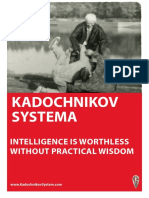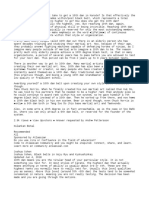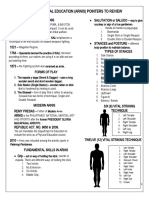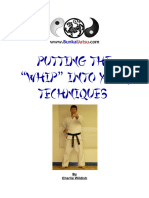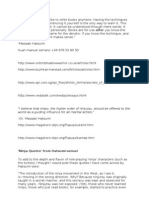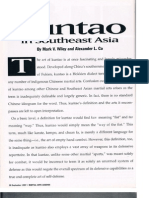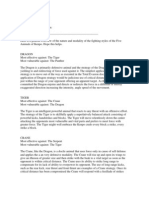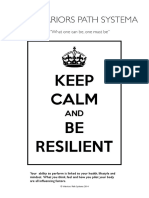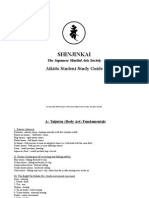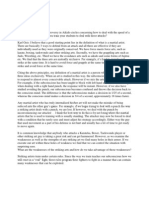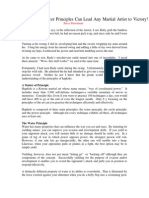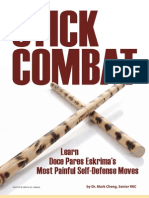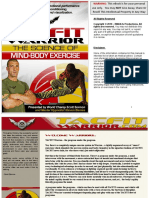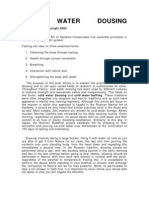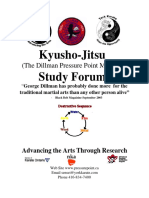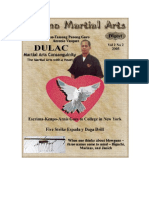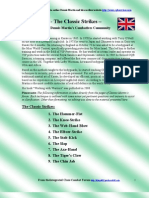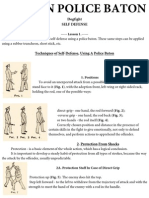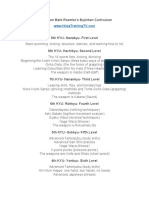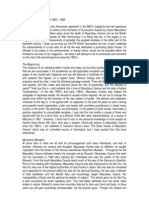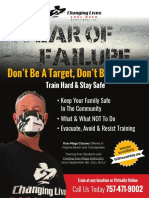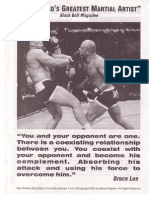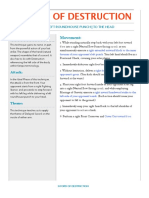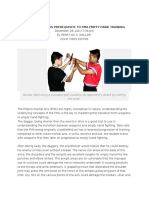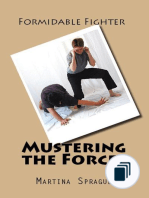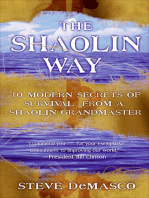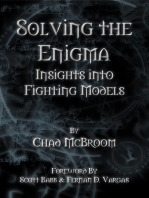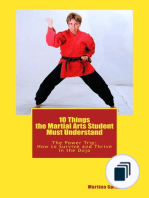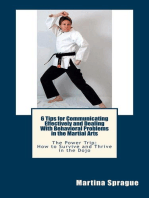The Nine Success Principles of Japan's Greatest Swordsman, Musashi Miyamoto PDF
The Nine Success Principles of Japan's Greatest Swordsman, Musashi Miyamoto PDF
Uploaded by
Diana RiveraCopyright:
Available Formats
The Nine Success Principles of Japan's Greatest Swordsman, Musashi Miyamoto PDF
The Nine Success Principles of Japan's Greatest Swordsman, Musashi Miyamoto PDF
Uploaded by
Diana RiveraOriginal Title
Copyright
Available Formats
Share this document
Did you find this document useful?
Is this content inappropriate?
Copyright:
Available Formats
The Nine Success Principles of Japan's Greatest Swordsman, Musashi Miyamoto PDF
The Nine Success Principles of Japan's Greatest Swordsman, Musashi Miyamoto PDF
Uploaded by
Diana RiveraCopyright:
Available Formats
THE NINE SUCCESS PRINCIPLES OF JAPANS GREATEST SWORDSMAN: MUSASHI MIYAMOTO
Scott Sonnon: The 9 Principles originate in two sources having different translations for the same text. Miyamoto Musashi (c. 15841645), was a Japanese swordsman famed for his duels and distinctive style. Musashi, as he is often simply known, became legendary through his outstanding swordsmanship in numerous duels, even from a very young age. He is the author of The Book of Five Rings, a book on strategy, tactics, and philosophy that is still studied today. I first received this book in University during an Asian philosophies course. Little did I realize that this would have far reaching implications into my martial art training. What I learned from Martial Art: Teach only what you've embodied and embody what you teach. I share these with you because these 9 principles Ive mastered (and mastery, in this context, means that when I need to do them, I can do so with zero drag). There are certainly issues Im still working on. Im not enlightened. But on these 9 issues, Im fully awake, and ready to kick ass when needed. These principles won't make you enlightened either. You won't levitate from mountains. You won't necessarily even be the most popular dude or dudette on the nightclub scene. But these will 100% make you a successful businessman or woman, make you the one people come to in a crisis or for help, make you the person people turn to when they're unsure how to proceed, make you feel personally ready to handle any shift, big or small, that needs to happen in order for you to facilitate growth and development in any aspect of your life. These aren't elusive virtues that you spend a lifetime never mastering. These are concrete lifestyle strategies which you can embody in less than 2 years and which will incrementally transform you into the man who others admire, trust and respect. Admiration, trust and respect. These are the cornerstones of success.
Principle #1 Principle #2 Principle #3 Principle #4 Principle #5 Principle #6 Principle #7 Principle #8 Principle #9
Do not think dishonestly. Avoid Dishonesty. Speak the truth and do the right thing. The Way is in Training. Daily, diligent training. Become acquainted with every art. Practice art. Know the Ways of All professions. Develop professionalism. Distinguish between gain and loss in worldly matters Develop Intuitive judgment and understanding of everything. Trust your intuition. Perceive those things that cannot be seen. See behind the illusion. Pay Attention even to little things. Study the details. Do nothing which is of no use. Discard baggage. Order clutter.
PRINCIPLE #1: DO NOT THINK DISHONESTLY
Scott Sonnon: Avoid Dishonesty. Speak your truth and make the right, hard choice. Historically this was one of, if not the, most challenging of the principles for me, because as a child my voice was squashed out through humiliation, abuse and debasement. It was only through martial art and university debate that I discovered the pure potency and cumulative power contained within this first, and arguably most important principle. It seems easy enough, right? Just be honest. Do the right thing. But in practical application, full of foibles and flaws, insecurities, doubts, desperations, its incredibly overwhelming. Ill give you a personal example. I was invited to be a guest at the US Marshals Academy (USMA) co-located at the Federal Law Enforcement Training Center (FLETC). Jodie and I decided before I left that no matter what happened, I would speak my truth... even if it meant never being asked back and losing any potential contracts in the process. Now, you must understand that the USMA is the top, for nearly all of the federal agencies look to the Marshals training as the best in the country, if not the world. They pride themselves on being the most cutting edge. If I landed a contract with the US Marshals, I could pretty much be certain, there would be no end to contracts forthcoming (especially considering there are 94 agencies represented at FLETC alone!) So, when the time came, and of course it did, the Senior Supervisor asked me my opinion, I said, Are you sure you want to ask me this question, because Ive obligated myself to speak my truth even if it gets me kicked out of here, lose any chance at a contract and never invited back again to USMA or FLETC in general. To his credit, he didnt baulk. He even laughed and said that few people have the balls to speak their minds.
I told him and the other trainers what I thought. Of course I sandwiched the critique using the PCP approach, Praise-Critique-Praise in order to insulate the criticism from the resistance of our ego. I have to commend you on the drill design, because it really helps the recruits identify their weaknesses, which is that they digress into a cluster-f#$k rapidly under stress. If we made these modifications to their strategies and tactics, theyll be significantly more efficient and effective at resolving the drill performance that you so intelligently designed. They looked surprised enough to ask me to demonstrate what I meant. They asked for sample drills as examples. Now, only half a year after that I regularly receive contract offers, consultation requests, and even became a certified instructor for FLETC! All from speaking my truth, and surrendering any attachment to desperate desires... Having the courage and conviction to make the difficult, right decision over the easy, wrong decision sounds simple enough, but like in my example above... it can be so compelling, even seductive to make the wrong decision because it seems to be easier, shorter, or faster than making the right one. When I began working with special operations and special purpose units in the military and law enforcement, my teacher said to me, Do not step to the left or to the right; keep your honor in every decision even when it seems that you will lose face. Running a business where my life has become mostly transparent, in order to truly lead from the front and never ask of a student what I do not embrace myself, has also increased the presence and power of Principle #1 in my life. What may sound like a burden actually acts as a blessing. For living a life as if someone is always watching helps you realize the accountability of your actions and behavior. Of course, eventually you want to transcend doing (or not doing) something because of the presumption that others are watching, and simply do it because its the right thing, even when theres no chance that someone else is watching. But transparency, or external accountability, is a first and critical step to teaching ourselves internal accountability, also known as responsibility. Sometimes you have to bite your lip; other times open your mouth. But its never easy. That is what is meant by God comforts the disturbed and
disturbs the comfortable. If youre comfortable, youre probably making the easy, wrong choices. You can see this even in your exercise: if youre able to cruise through your exercise without ever feeling stressed, uncomfortable, and challenged to the point that you want to quit, then youre not inducing sufficient stress to create an adaptation to help you grow healthier and stronger. Sure, nostress exercise has its place... as dynamic relaxation. But without stress, you wither and die at an accelerated rate. No junk reps. Every rep has 100% of your awareness to form... an honest rep, a real challenge every second. Thats also true of our character development, even in business. Precisely parallel to what the martial arts teach, if it doesnt improve your character, then even winning can become a liability; but if it does, then even losing can lift your nobility. Real health and fitness, whether exercise or nutrition, is about training hard with the right technique, even when no one is looking and could never find out that you cheated. Some know that the greatest complement that I could give someone is to call them, wholesome. Wholesome isnt innocence, though an innocent person is often wholesome. Wholesomeness can be lost, just like innocence. It takes 20 years to build a solid reputation, but only seconds to unravel it. Wholesomeness is the virtue where you do the right, honest thing, even when no one else is looking and could never find out you did it. Sufi master Mushtaq Ali Al Ansari: On the first rule "Do not think dishonestly", the important operator is "think". Musashi has no problem with being deceptive to an opponent, however he understood that self deception is the key to failure. There are times that absolute honesty to others is not appropriate. Jalaluddin Rumi, in his book "Fehi ma Fehi" tells us that to speak truth to someone who is incapable of understanding it is functionally the same as telling them a lie. He instructs us to give truth at the level of a person's understanding so as to build their capacity for accepting greater truth.
Jesus spoke of this directly in Mathew 13: 10 - 13 10. And the disciples came and said to him, Why do you say things to them in the form of stories? 11. And he said to them in answer, To you is given the knowledge of the secrets of the kingdom of heaven, but to them it is not given. 12. Because whoever has, to him will be given, and he will have more; but from him who has not, even what he has will be taken away. 13. For this reason I put things into the form of stories; because they see without seeing, and give ear without hearing, and the sense is not clear to them. That being said, absolute honesty with yourself is a necessity of greatest importance. Ruthless self disclosure is one of the greatest, and most overlooked keys to success. I consider these nine statements to be the quintessential distillation of everything that Musashi wanted to tell his readers about his understanding of how to live life as a warrior. "Do not think dishonestly" may be one of the most important bits of advice ever given. If one were to truly embrace this one concept it would be life changing. One way to define "ego", especially for someone on a Warrior Path, is as "The part of you that lies to you". For someone who wants to follow that path of the Teacher, or the Warrior (often there is not much difference) this is the area of greatest struggle. So how do we lie to ourselves? Just think back to the last time you justified to yourself doing something that you knew was not right. Let's take something simple, like deciding you want to lose ten pounds to get into "fighting trim". You decide to do so by eating less and eating better. All goes well until you are driving home and are somewhat hungry. You see a sign for your favorite fast food place coming up in the next mile. You think
of your favorite food there, you know the one, all those calories, but it sure tastes good. Take a moment to imagine what train of thought you might go through to justify stopping and getting some of your favorite food, and why it would not REALLY be violating your choice to "eat less and eat better". That is a simple example of thinking dishonestly. The consequence of thinking dishonestly in the long term is that you will build a false persona that will have to be constantly defended. You can find a great many examples of this in the world of martial arts. There are all too many people who, being insecure about who they were, have embroidered their history just a little, and then are stuck defending that small bit of dishonesty by any means necessary. This of course leads to bigger and bigger lies, and eventually it leads to disaster. So to walk a "Warrior" path means extreme self-disclosure. How do your start? Pay close attention to your emotions, notice when you start justifying how you feel or what you do because of how you feel. That is the first step. Second, examine your justifications. Tell yourself the truth about why you are doing what you are doing. (This part can hurt your ego a bit so start slowly). Third, and this takes some work, practice telling yourself the exact truth about your feelings and choices. This will take a long time for most people, because frankly a lot of us have spent a good portion of our lives trying to avoid doing this. This means that you have to take the time to examine your motives. Steven Barnes:
Being brutally honest with yourself it probably the greatest gift you can give to yourself, and it will be life changing. Hard-won wisdom there. Heres the basic truth: a map is useless unless you know two things: where you are, and where youre going. The second is taken care of by clear-cut, written goals. The first is satisfied by an unwavering commitment to honesty. In business or finances: do you know your net worth? Balance your checkbooks? Do you deal with customers and clients with scrupulous honesty? In Physical training, do you lie to yourself about the amount you eat? Exercise? Do you know WHY youre not in the physical condition you wish, or the gap between where you currently are and the future skills you desire?
PRINCIPLE #2: THE WAY IS IN [DAILY, DILIGENT] TRAINING.
Scott Sonnon: Although Ive won international gold medals in 5 different combat sports, written 8 books, published 2,000+ articles, produced over 100 videos, presented at 10 universities, trained special operations units in 3 countries, appeared on television in 4 countries, taught seminars in 13 countries, been inducted into 3 different halls of fame, and raise 2 highly dynamic children from the 1 marriage, my life involves very consistent, mundane, boring, grueling rituals. Routinization isnt automation. To make something into a routine is to allow it to grow. If you can track it, you can improve it. Like I say to my kids, numbers are magic; the only language everyone and everything speaks all the time. Create a routine, and you can create growth. Not everyone knows how to craft a routine. And few people know how to teach others to create their own routines; or they pretend they dont because that would be giving away (the illusion of) power; though the only true power in the world is empowerment, for self and others. Routinization is self-empowerment.
However, to move up to the next level, to transform a challenge into a routine, takes energy. It often appears like a catch-22: you need more energy than you currently have to get to the next level of energy. If you have kids, or reflect back to when you were one, you could stay up too late and actually be over-tired since you need energy to fall asleep! Let me give you an example. In 2009, when I decided to come out of retirement one final time to compete in the 2010 World Martial Arts Games, I began training immediately. My coaches and I knew that we would actually need to increase my mental and emotional energy as well as my physical conditioning. If youve exercised before, you understand what I mean. When you exercise the right way, you actually have more energy than when you started. Of course, this isnt the norm: most exercise programs claim to be hard-core lauding you for puking, passing out and being so destroyed that youre forcing yourself to train through pain and injury. That isnt hard-core. Thats self-defeating egotism. Most of the fighters Ive faced, and most of the younger generation of martial artists coming up, believe that leaving the gym incapable of moving the next morning somehow toughens them up. Suspecting (correctly) that I would be facing fighters half my age, and 100+lbs heavier, I couldnt afford the luxury of ego; especially considering that although I overcame my childhood joint disease, Im not invulnerable to overuse and misuse injuries. Im probably more prone to them! I had to take the lesions I learned from the prior decade. Starting in the year 2000, I dedicated myself to logging 10,000 hours of practice in 10 years an average of approx 3 hours per day. I met that goal while preparing for the World Games, but the goals ultimate purpose only became obvious when I made the US Team and began training: the lesson of that decade of routinized daily physical practice was critical to preparing me for what I had to endure in the 10 months of preparation to fight at the Games. To prepare for any real challenge, the bone-rattling, teeth-chattering kind which threaten to filet the flesh from your skull, you must be more prepared than your opponents, stronger than any challenges you expect to face.
Some people like to say that you fight like you train. This is the worst kind of optimism: the reality is far bleaker than that. Repeat after me: The worst you do in training is the best you can hope for in performance. Instead of rising to our expectations, we fall to the level of our training. To face the world-class competition I was approaching, I knew that I needed to lift my energy far above any anticipated level of performance. You need more energy than you currently have to get to the next level. So that means you need to go where you havent been to get what you havent got. It only takes one step across the threshold of your prior performance, but to be sustainable growth, its got to be with good form. You need to muster as many allies, internally as well as externally, in order to take that step into the chaos and friction of the unknown. Thats why finding good coaches, whove been there done that and taught others to do the same, is an essential step in achieving excellence. And that is exactly what I did. Especially when youre about to go off map you need to have mastered map-reading (read here: routinization.) For instance, in the four day minicycles of TACFIT Warrior Ethos, youll be waving the intensity of your training so that you can plug into the magically elusive biorhythm of the universe called the Golden Mean, or Fibonacci Sequence, which when routinized lifts your energy greater through training. In addition, you will marry this energy wave to a four-day rhythm of effort toward your life goals. TACFIT Warrior is the very first time this has been presented to the public, a secret previously reserved only for my most private students and core cadre. The challenge comes not on the discipline, but on the continual returning to and increasing of the routine. No matter how masterful you become at routinizing your growth, it always feels difficult; its just that after a few cycles of a routine, you dont mind as much. For example, when you go for a run for the first time in a long while, you hit that first several hundred yards, and your breath starts to become rapid and shallow, your head pounds, your heart races, little aches cascade in and
around your body. Youve hit circulo-respiratory distress. Unfortunately, most of us stop here thinking this is the end of our current conditioning, when actually this is the chrysalis moment where we are about to cross through and experience a runners high a biochemical and neurophysiological phenomenon that makes us feel like were on top of the clouds and could continue forever. Literally, whats happening is that because we didnt stop at the distress, our brains grew more complex (called neuro-plasticity) in order to make what we had refused to quit doing, more efficient easier. Just like my mother used to say, everythings difficult until it becomes easy. I had thought this was some trite flippancy, but in reality its a colloquial way of describing one of the universes most sophisticated transformations! God bless mothers. This is the result of daily training. Consistent, mundane, boring, grueling practice. The body, mind and spirit adapt. They grow. They gain more energy, complexity, sophistication and potential than they possessed before you trained. You just have to resist quitting. You must have faith that what youre about to do will result in the creation of more than when you started. And if you lack that faith, then start with smaller routines in order to build the courage and conviction that you will grow from every challenge you prepare for, and eventually every challenge you encounter, apparently prepared or not. Some more words from martial arts instructor and Sufi master Mushtaq Al Ansari: Musashi said "The Way is in training" When Musashi uses the word "Way" He is referring to a rather specialized meaning. The word in Japanese is "Do" and it is hard to give an exact equivalent in English. We can perhaps understand it a little better by contrasting the two Japanese terms "Jutsu" and "Do". Jutsu (also spelled jitsu) means "art", "technique", "method", "strategy", while Do means "path", "road", or "way", and implies a way of inner development.
So while Ai-Ki-Jutsu would mean "Mind-Spirit-Method" and give you good techniques for making people fall down and hurt themselves, Ai-Ki-Do would mean "Mind-Spirit-Way" and would suggest that you are working on inner development through making people fall down and hurt themselves. So when Musashi says "Way" he means a set of skills that provide a structure for self development, such as Tea ceremony, Flower arrangement, Archery, or Fencing. The important thing to remember here is that pretty much any set of skills can become a "Do", it is all in the approach. Then we have "training." What does Musashi mean by training? Again it is a somewhat specialized meaning. "Training" in this sense is not just learning a skill, but continual refinement and integration. So when we train (with Musashi's understanding) we strive for greater and greater integration of body, mind and spirit, of structure, movement and breath. There is no theoretical "upper limit" to this refinement, it is incremental, and as one progresses it also becomes more ephemeral. So when Musashi says "The Way is in training" He is speaking of an ongoing process of refinement in one's chosen art. This refinement has no end to it and this kind of refinement in fact evolves as you do. As you progress there becomes less and less of the superfluous, leaving only what is essential. Steven Barnes: Ive published twenty-four novels, worked in television, film, stage, magazines and newspaper, won national awards and been a New York Times bestseller--twice. Earned three black belts, was Kung Fu columnist for Black Belt Magazine, competed nationally in Korean-style karate, taught Tai Chi for twenty years, and talked down muggers twice my size. Im a stress and success counselor who has coached international champions, princes, captains of industry, and movie stars.
And all of that stuff is just the product of wanting to know as much as possible about three things: human motion (martial arts, yoga, RMAX), communication (writing and teaching), and human identity (self knowledge and relationships). And the approach was simple: to learn one new thing every day. Just one. To improve myself in my alignment of body, mind and spirit by just 1% a week. Multiplied over months, years, and decades, it has led me to heights I could not have dreamed of. Not because I myself am unusually talented, but because I never quit, and knew that if I kept taking one step at a time in the direction of my dreams, I would eventually be exploring strange and wondrous territory. And so it has been.
PRINCIPLE #3: KNOW THE WAYS OF ALL ARTS.
Scott Sonnon: Art might be defined as expression of the deep psychological and spiritual structure of the self, refined through technique. The art that Ive studied most is human movement, in particular martial. Becoming a student of body language, you come to realize that everyone tells you their entire life story all the time, even when theyre lips are lying to you. To study art is to master communication. If you can truly hear what people are saying all the time, then youre able to accurately offer your services to them, whether in a relationship, at the boardroom, or even in a fight for your life. Fighting has always been my petri dish, the micro of the macro, where all of the universe has been encoded, or at least, the secrets of humanity. Thats why, although we master a martial art, we spend a lifetime mastering ourselves. The martial art is only an educational delivery system for looking at our own reflection, and calmly being able to see the true reflection that others cast upon the world.
Imagine the first time that you watch a sport. I remember the first time that I saw wrestling: it appeared like a tangle of flesh, like thugs squeezing each other into submission in between short bursts of frenetic scrambling. As I learned the art of grappling, snapshots became clear a technique here, a set-up there eventually unfolding into a symphony of movement that only the conductor can truly appreciate in its diverse layers of individual components synergized into a singular, beautiful note. Just as a linguist can distinguish the vagaries of geographic dialect, decades of competitive fighting across several disciplines allowed me to appreciate movement as art, and to listen to the opponents story as he strode onto the mat. The buoyancy of his heel illuminating his Judo, the looseness of shoulders the Russian orientation, the tightness of his lower back the lack of sufficient recovery from prolonged stand-up grappling. So the story unfolds, and having reflected upon my resources, provides me with the strategy I shall use Attack the legs. The dance begins. The study of an art begins to seep into all that you do. For me, travel takes me to many countries, and gives me the opportunity to observe their cultural movement tendencies: the fast 90 degree turns of Australians, the sauntering hips of the Russians, the dramatic gesticulations of the Italians, even my own tendencies in the forward falling gait of the Americans. Every country has its own flair. But each tells a story: the wide expansive bush of the Aussies, the cold, stoic ice of the Russians, the heated rolling hills of Italy and the pioneering forward push of the Americans. Practicing an art decodes the complexities of a discipline. And it matters little what art you study, only that you find one, and apply yourself across the years until you reach that magical state of unconscious competence. Exercise can be its own art form: it can be gross and repulsive diminishing its value and even destroying the artist, or it can be elegantly crafted while still beating with barbaric effectiveness. As you practice the TACFIT Warrior, youll decipher the components over several cycles of practice, modifying adjustments to optimize your peak performance. Especially in todays world, you must appreciate the Way of the artist. But dont spend forever gazing into the maze of complexity: you must start somewhere, with something. Youre given an opportunity with TACFIT Warrior to understand the art of war in a visceral, private way: through the
internal experience of disciplined exercise. Once you master that base, youll gain the confidence, courage and energy to strike out on other forms. As Musashi writes, to master one thing is to master 10,000. The details differ from one discipline to the next, but the process of mastery is the same. For me, it was easiest to start as close to home as possible: with physical exercise and nutrition. These two art forms, interwoven, form the basis for lifting energy in the mental and emotional realms and give you access to all others. Mushtaq Ali Al Ansari: The third principle, "Become acquainted with every art" Has been interpreted in several ways over the years. It is often taken in its limited martial context as "explore all martial arts", and there is some virtue in that notion. To me though, I have come to understand it in a broader sense as "be a generalist". From the martial standpoint this is of course important advice, though Musashi did not mean "study every martial art". His intention was more along the lines of "be familiar with all delivery systems" in a very general way. As we saw in the early 1990's when Brazilian Jujitsu made its way onto the world stage, it is the delivery system that you are unfamiliar with that will defeat you. As the UFC has shown us, you can focus on striking and defeat, but you must have a deep understanding of the grappler's art to do so. I think though, that Musashi was speaking to a more general understanding of this aphorism. Humans thrive in an environment that offers significant novelty, and our neurology is optimized for lifelong learning. "Become acquainted with every art" is a call to what used to be called a "liberal education". There was a time when a person was expected to be conversant in both poetry and mathematics, to be able to repair the plumbing and compose an elegant letter to the editor of the local newspaper. As we move more toward specialization we give up significant freedom. If the only way we know to find food is to go to the supermarket, we starve if the supermarket closes. Perhaps even more troublesome is the idea that as
we concentrate all of our faculties in just one area of specialization we lose the experience of novelty (that which is new, surprising, and confusing) which is the first step to debilitating old age. So "become acquainted with every art" is Musashi's way of saying to us, "constantly strive to expand the area of your competency in all areas of your life. Steven Barnes: Art is the revelation of the deep structure of the self, channeled through disciplined form. As you study the different arts: graphic, dance, musical, martial, ceramic, narrative, cinematic, whateveryou will eventually see that there are similarities to all of them. That artists from all times and around the world must master a basic vocabulary before they can be free. That Bruce Lee mastered the confines of Wing Chun before freeing himself into Jeet Kune Do. That Fred Astaire sweated through countless hours of tap and modern before he ever danced on a ceiling. Freedom is found, paradoxically, within stricture. It takes about 10,000 hours of practice to master any discipline. Any art. Know this, and chart your path accordingly.
PRINCIPLE #4: KNOW THE WAYS OF ALL PROFESSIONS
Scott Sonnon: Develop Professionalism. The principle actually describes understanding the job all people do in order to appreciate their lives and perspectives. But going deeper, we discover that this relates to appreciating the value of seeing the total project from the quality of its individual components.
This relates to Sun Tzu, another great martial philosopher, who advised, know your self and know your opponent and never in 100 fights shall you walk away unvictorious. But this actually isnt the whole truth. It misses one of the most critical arenas of knowledge: you must know the rules of engagement. Only all three give you a full 3D understanding of the entire game. In martial art competition this manifests glaringly. As an athlete, coach and referee, I was given a birds eye view of the event. I knew my technique, what I excelled at, and how well I was conditioned. My game plan, tactics and rituals were all grooved. As a coach, I realized that I needed to select which voices to listen to when I became fatigued, overwhelmed or made mistakes, which buttons to push based upon the type of energy I needed to access, and how to change strategies 180 degrees when obviously working harder at the same thing wasnt working. As a referee, I appreciated that even when you do everything perfectly, if its not visible to the officials, performed without the right obvious intent, or even if the referee wasnt aware of particular rules, sometimes things wont go your way regardless of your performance. This translated into my understanding of multiple varieties of combative engagements: military close-quarters combatives, law enforcement hostile subject control, civilian self-defense, correctional, executive, celebrity and dignitary protection. Each domain had its own rules of engagement, which shaped the strategies possible, the tactics crafted and the techniques adapted. This in turn formed the mental awareness needed and the emotional control required. Three-dimensional professionalism of course applies in business. As an author, you must learn your voice, as well as the audiences ear. But you must also learn the delivery system, the medium and its capacity, potential, quirks and tricks. A product and its marketing are one and the same, seamlessly interwoven, internally contiguous. Education is insufficient. You need inspiration as well: in the 21st century, the broadcast noise is so pervasive that all but the strongest signals become buried. In your daily exercise, each task has to accomplish a specific job: the Technique (good mechanics), the Effort (not pain) and the Discomfort (not difficulty), or T.E.D. The TED must be properly balanced in order for you to
achieve the product that you intend. To produce great results, you cannot sacrifice form, waste effort, or avoid discomfort. In your daily nutrition, this becomes the job performed by your proteins, your fats and your carbs. How they are interdependent and intertwined determines your healthy energy. To understand someones job is to lift the most lowly positions nobility and expose the most lofty positions humility. As a professional, I pour excellence into every task I do, for every act has value, and as a result each deserves the greatest quality possible. Certainly it may be seductive to try and cut corners and perhaps in the past economy you could get away with that (but ultimately, did they get away with it?) Each task is integral. Each job critical to the overall function. Mushtaq Ali Al Ansari: From our modern point of view this might seem to be a rather daunting task, but referring to the full text of the Book of Five Rings, we see that Musashi groups "professions" into just four categories. These are the Farmer, the Artisan, the Merchant and the Gentleman Warrior. These four broad categories, while coming out of a medieval Japanese world view, still have value today as a general model for broad categories of "professions". Musashi talks about understanding the "Way" ( Japanese D, Chinese do or Tao) of these careers rather than the "art" ( Japanese Jutsu, Chinese sh). What Musashi suggests, I think, is that one benefits from understanding that each "profession" has, at its most fundamental level has a methodology that can be used for mindfulness and self actualization. By using the word "Know" in this aphorism, rather than "be familiar with" as in the last one, I believe that Musashi was urging us to grasp the "Way" of the four professions at a deep level, one that allows us to learn from each way.
In the Earth Chapter of the Book of Five Rings, Musashi gives an in depth example of the Way of the artisan by example of carpentry. Musashi views the study of the Ways of the four professions as a method of self-correcting ones course. He says in the Earth chapter: "It is difficult to know yourself if you do not know others. To all Ways there are side-tracks. If you study a Way daily, and your spirit diverges, you may think you are obeying a good way, but objectively it is not the true Way. If you are following the true Way and diverge a little, this will later become a large divergence." Each of the ways can give us valuable insight into how to maintain our course. It should perhaps be noted here that our modern culture has all but lost one of the four ways. That being the Way of the Gentleman Warrior. Using Musashi's model, we could say that the other three ways have become unbalanced in our culture because of this loss. If we want to regain the balance we need to recreate the Warrior ethos and find ways to reincorporate it back into our society. Otherwise all we have is what Musashi refers to as "mere sword fencing", the form without the substance. Steven Barnes: The butcher, the baker, the candlestick maker. There are thousands of different ways we as human beings make our way in the world. As a writer, it is simple to explain why I love to study different approaches to earning a living. It is fodder for characters and plots. But what if you arent interested in spinning exotic tales? Well If making money is important to you, it is useful for you to understand how customers and clients earn their daily breadwhat it means to them, what they exchange for it. No matter how you want to earn your way in the worldand make no mistake, you must support yourself to be an adult human beingthere is someone else who has already mastered that Way.
You need not reinvent the wheel. Find someone who has already achieved similar ends, and learn how they used their minds, their emotions, and their physical bodies. But even if money is not your aim, to understand the way human beings invest 30% of their lives is critical to understanding humanityand ultimately, yourself. And understanding yourself is the critical core of wisdom.
PRINCIPLE #5: DISTINGUISH GAIN AND LOSS IN WORLDLY MATTERS.
Scott Sonnon: My martial arts coach in Russia and I were discussing the effectiveness of different knife fighting styles. During the knife fencing sessions, I was repeatedly winning over my opponents using the lunge he had taught me. However, during the scenarios in the combatives (non-sport) sessions, I became a pin-cushion, getting killed by the very opponents I so easily beat during fencing. Asking how could such a good technique obviously perform so badly in actual mortal defense, he asked me how I knew it was a good technique. I reminded him of my fencing performances and he chuckled. He related a story to me about a farmer who lived quietly with his family on a small plot of land. His family was healthy and happy, but did not have much in the way of material possessions. They worked hard, together, tending to their garden and plowing their fields. One day, the farmer awoke and discovered that his old horse that he depended on for years to plow his fields, had escaped through a broken fence and was nowhere to be seen. A neighbor came by and saw the farmer in his plight, and cried out at the bad luck facing the old man. The old man calmly replied, , o, ? (or in English language, good, bad, who knows?) and went about his business. A few days later, hearing the thundering sound of hoofs outside his cottage, that farmer looked across a far away hill and saw a whole herd of horses
making their way to his horse pen. His old trusty quarter-horse has indeed returned, and brought a few friends! The same neighbor, bearing witness to this amazing sight cried out wow, what great luck you have! The farmer calmly replied, , o, ? The farmers son, seeing the wild horses sitting in the pen, decided to start breaking them in. It was tough work. One day, a stallion bucked and knocked him to the ground, terribly breaking his arm. It was a busy time of year, and his support was desperately needed to work the land. The neighbor saw the plight of the family and cried wow, what bad luck you have, to which the father replied, , o, ? While his son was recovering, the father was out drawing water for his horses. He saw a battalion of men marching down the lonely road. The captain of the troop came up to the home, and asked if the old farmer had any able-bodied men in his household. The region was at war and they were conscripting all men to fight! The father could not hide the fact that he had a son, and the captain walked into their home. Upon seeing the state of the boy, with a broken arm, he decided that the boy would be of no use to the military, and the troop kept on walking. Upon seeing this, the neighbor cried outwhat good luck you have! to which the father replied , o, ? Context determines everything. What works at a technical level in one field does not necessarily work in different rules of engagement. Sometimes, we can easily forget that it isnt the products that are the same, but the process. We have to zoom out and consider the whole picture and how it interplays to determine what is good and what is bad for any particular context. The difficulty comes with attachment. We become attached to our successes and our failures. We believe that if we do ABC again, well be successful again; and if we do XYZ again, well be failures again. So we stick to what weve been doing, and avoid what we dont. Unfortunately, this only works until it doesnt which is often at the worst imaginable time. You can see this in nutrition. Eat one particular way and change just one circumstance in your life, and suddenly you become sick. Exercise in one
particular range of motion, and need to move rapidly in a new direction, and you become injured. To be sustainably successful over the long-term, not merely the short or near, you must be error-focused with an unattached attitude. Good or bad is irrelevant. Does it serve the upcoming challenge or not? If not, simply begin the necessary changes. You are not your habits. You are not the way youve been doing things. You are not good if you continue them. Youre not bad if you do not. (Contrarily, youre not bad if you continue them, or good if you dont, either.) It boils down to effectiveness and efficiency. Effectiveness is value / risk. Efficiency is useful / total work. Certainly it can seem like the risk is big and the total work is huge, but if you zoom out and extrapolate the ultimate conclusion to your drive and determination, you may just see that what youre currently doing is effectively efficient. And if you find that your low risk, minimal work approach ultimately isnt bringing you what you had hoped, perhaps that even keel approach isnt good at all. Steven Barnes: Any model of success demands that you measure your results. Know when you are approaching your goals and when you are moving further away. Otherwise, you will be lost in the woods. You must maintain sensory acuity, get feedback as frequently as possible. Understand something: in the arena of business, you might not get feedback for weeks or months. In relationships, it might take years to develop the lifestyle, healthy emotions, and physicality that will attract the kind of partner you deserve. But if you consider that the basic elements of focus, passion, discipline, resistance to discomfort, goal design and breakdown, energy and so forth are displayed and utilized EVERY time you work out, you can measure your progress and results on a daily basis. And feedback like that is absolute gold.
PRINCIPLE #6: DEVELOP INTUITIVE JUDGMENT AND UNDERSTANDING FOR EVERYTHING.
Scott Sonnon: Trust your Intuition. Our mind clouds: too much, too fast, too soon, too hard, too many... We feel robbed of compass and map, overwhelmed, underequipped and behind the gun. The throat tightens, teeth rattle, head pounds, gut clenches, heart races, breath pants. And then, a tiny moment of clarity, the smallest of hunches suggests a solution. Weve all experienced it. But how many times have we ignored the kinesthetic cues? Paradoxically, the hunch tends to be both the most difficult (albeit often simplest) of keys, but also carry with it a glow of optimism that despite the challenge, if we do this dreaded thing, the best will come of it. And yet we doubt that glimmer, and scoff at that unlikely hope. I was alone. Alone with an overly-optimistic internal voice. You can do it. Screw what they say about you. Lets do it anyway. Doctors and teachers told me to not expect great things from myself, to see if I could become content to find a good factory job where there wasnt much thinking or athleticism involved. I was told just to go with the flow and find contentment with the hand I was dealt. And for a short time, I took the advice of authorities and experts; ignoring the gnawing, itching, writhing suspicion that I was about to lose my potential, and wander forever in a polluted wilderness of mediocrity. But clawing inside my skull, trapped within a corset of mismatched agony, the life I was leading did not match what this intuition told me I was capable of becoming. So I stopped listening.
We are often advised to go with the flow. Yet in many challenges, this advice tends to be unwise. Often, living up to our potential with honor and integrity, means you must swim opposite the current, even unreasonably leaping up waterfalls alone. And then we strike off on our own to find ourselves. The maze of seeking ourselves disorients us. You cannot find yourself; just like you can neither flee nor fight yourself. You can only forge yourself. You are not out there. You are the force that endures the struggle. And only the cauldron will allow you to differentiate the noise of the mind from the signal of your intuition. Taking counsel from that overly-optimistic intuition tells us were almost there. But the way is in training, so we must stop seeking and start training to become purer versions of grace. In training, we impossibly overcome resistance to forge the indomitable spirit one baby step at a time. And the stronger we become, the more courage we have to listen to our intuition. Face the impossible in training and you will not balk when the unreasonable presents itself in life. When others try to cut you in half to make themselves look bigger, remember that it is not fear of you, but fear that their hope. Fear that their own intuitions optimism is a lie that shall let them down. Clear conscience never fears midnight knocking. Follow your intuition and do the hard, right thing daily, and fear evaporates the darkness, illuminating the reality of your limitless potential. We can confuse our desires craving with intuition. And in todays crunchy self-help world, desire has become nestled in the clothing of bliss. Like go with the flow were advised to follow our bliss. Many follow their bliss only to find theyve obeyed their desires. We cant find ourselves, we cant follow our bliss. We must lead it with courage. Follow your purpose the direction your intuition suggests - and bliss comes after. Whenever we become lost, and feel like were stuck in an aimless purgatory, our intuition nudges us toward fears, for the closer we move toward our fears, the more our higher purpose unfolds. And the farther we move through our fears, the greater our courage becomes to unlock our mental chains. For decades now, I have continually reinvented myself into successively
more accurate versions of my intuitions vision. In some essential ways, I no longer recall who I was before beginning this journey. Every day that you heed your intuition, you achieve a victory. Hate me, defame me, derogate me. No matter. Hit me. Throw me. Break me. I win. You can't hurt what won't stop. Never give up. Never give in. And the debt's paid back by being knocked down and getting up yet again. Steven Barnes: Back to the question of art. No matter how much technique you learn, an artist must eventually move out of the comfort zone, out of the explored area of the map onto the place cartographers used to mark as here there be dragons. And the only way to be safe is to hone your intuition, your ability to predict how an audience might react, which way an opponent might move, which way the market might shift. Which voice in your head to listen to, and which to ignore. You begin with small things, and move onward from there, testing, testing. Allowing yourself small failures that wont cripple your plans, with the specific intent of learning those things that cannot be taught.
PRINCIPLE #7: PERCEIVE THOSE THINGS THAT CANNOT BE SEEN
Scott Sonnon: See behind the illusion. When Musashi wrote that to master one thing is to master 10,000, he didnt claim that if you become an expert at one thing then suddenly youre an expert at everything. He alludes to the magic of the process. I began to notice this in martial art first, where once an individual mastered a foundational base style, the speed at which s/he internalized other styles accelerated at lightning speed. So, I listened. I focused on one base style,
Sambo. After nearly a decade of diligent practice, I was awarded the most coveted distinction in the discipline: Honorable Master of Sport. Once that happened the rate at which I was able to assimilate or approximate skills in other arts dramatically accelerated. The details of learning a new skill or discipline fog the actual developmental process. If we see behind the illusion of the obstacles, hardships, surprises and mistakes, we would see an architecture of attitudes that unfolds as we pursue mastering a discipline: 1. I wish I were but I can't be that. 2. If I try to be that I will fail. 3. I'm not ready to be that. 4. I'm doing this to become that. 5. I'm failing but I'm doing this anyway. 6. I've become this but I can be much more. And once we arrive at the sixth attitude, and have mastered one thing, we realize that we can begin at the third attitude, and get right to the fourth. This confidence from experience accelerates the rate of development. Eventually, we begin at the fifth attitude, and the cycle of mastering new skills has little to no interference. The problem comes when we first start out on mastering our base; we dont have the benefit of experiencing the process already. Because we dont have it at a conscious level, we cant apply the process with conviction, simply because courage comes after the time that you need it. So many wallow at the first, second or third attitudes. People often wonder what they would do if they didnt fear failing. Unfortunately for those who havent yet realized their self-mastery, success is paved by failure. You cannot succeed if you do not deliberately accept failure, and continue anyway. Quitting is the only action that can thwart this process. All of the obstacles, hardships, surprises and mistakes represent illusions; excuses to give up and shut down. Our excellence, our beauty, lies in the fact that we strive.
This isnt restricted to learning a skill, as it also relates to experiencing a challenge of any kind. At the 2010 World Martial Arts Games, I encountered the challenge of my life; not the one I was prepared for, but the one that I got. Im a student of myself, my opponents and the rules of the game. I train diligently, meticulously and specifically. Assessing my value, the quality of the opposition and the format of the engagement, my training schedule reverse engineers back from the intended peak performance into daily increments of goals to be achieved. Really its as much science as it is art. But at the Games, at 40 years old, with my entire reputation and the very real threat of destroying my companys credibility on the line, I was given the gift of a challenge much greater than I had planned for. I say gift because enduring so many hardships and challenges, Ive come to appreciate that the Universe never gives us a puzzle we cannot solve. If youre tossed a bowel-shaking earthquake of a challenge, its a high complement. It certainly didnt feel like a complement at the time. The dream of those glaring lights, screaming crowd and team, the smell of the mat, the glow and pangs of the cuts and dislocated joints, the humble bow of the medals placed, the tears of victorys gratitudethese were all scenes I had envisioned vividly, obsessively since a young child. The image haunted my entire life; and no therapists interpretations of the vision could dispel it. So, when I won my spot on the US Team, I knew viscerally that this was the event I had awaited my entire life. All I had to do was take the wealth of knowledge I had learned from the worlds best coaches and apply it in the incremental, systematic, if not obsessively precise, manner with which my training programs have become associated. And there at the World Games, the weight and age divisions were suddenly combined into an ironman corral, pairing me against fighters half my age and 100+lbs heavier. I could deal with that. Then, some referees were unaware of the rule interpretations, so I was being stopped for executing fight-ending legal techniques. Okay, persevere anyway, I thought. But then the rules began to be changed. As an international category referee, I understood rule disputes, but these rules were changing during my fights: when the fight ended, the rules were different than when they began. No
matter what I did, I was encountering visible, concrete impossibility. I had stealthily dropped from the fifth to the second attitude. My wife, Jodie pulled me behind a very metaphorical black curtain separating the competition field from the back auditorium, as the facility was massive beyond belief. She could see that I would never quit. I have always been willing to die facing a challenge rather than give up. But Jodie saw that I needed to be reminded of the truth behind the illusion. Jodie said for me to accept that Im going to get injured and that well deal with it afterward; that it doesnt matter about the medals; that it doesnt matter if I lose. It only matters that Im a spiritual warrior, and that I needed to go back out there and be who I was, who I have always been committed to being. And instantly, I was right back up to the fifth attitude. I thought to myself, how could it end like this? How could an entire lifetime of seeing this happen be wrong? How am I supposed to reframe this for the rest of my life? I hadnt even begun yet to think of what it was going to do to my company and family. When I returned to the mat for the semi-final match, I fought well, carefully pacing out my energy, applying my calculated strategy with accuracy and economy. The buzzer sounded, and the referees called it a draw. Because it was a world championship, there could be a tie, so it went into a sudden death overtime. Jodie said to me, why are you holding back? I explained that I still had one more fight for the finals, and against the toughest fighter yet, one over 100lbs heavier, and whom I had already lost to earlier the night before. She grabbed my face and said, No! You need to give it all now. Forget about the next fight. You must be all here now. Give it all, right here, right now. In my mind, I only had another fight left in me. Yet, winning this sudden death round would expend all of the gas left in my tank. The crowd never knew how a fight would be called because of how the rules kept changing, so I knew that this had to be visibly decisive. I had zero energy left at the end. And although my opponent was completely fresh, they wanted me to step in immediately and fight the finals. I stole a moment to go to the bathroom, before returning to face that Goliath, the
fight of my life. When the fight started, it became lucidly clear that this was the Universe playing out a drama, teaching us all a lesson; that I must win for the thousands watching and the many more who would read about this story in the future. That this was an object lesson in truth, in not believing the illusion. But just because you know the process behind the illusion, doesnt mean that you cant be knocked down. If youre facing any real, life-transformative challenge, something worthy of your effort, then you will be knocked down. It only matters that you remind yourself of who you are, that this aint your first rodeo, that you know that all of these hardships, obstacles, surprises and mistakes are an illusion, as Jodie reminded me. Before the referee raised my hand, I knew that I had just completed a 40 year journey, that the Universe had made it so that the entire process from training Day Zero to the Gold being placed around my neck as a world champion was totally transparent, so that others could be inspired by this most unlikely of champions swimming upstream from the shallow end of the gene pool. That they could, for one moment, taste what it is to be noble and free from the illusion. Steven Barnes: Heres my very best martial arts story. Twenty years ago, I was walking out oflets just say a friends apartment in Oakland at about two in the morning. Ahem. On my way to my car, a figure stepped out of the shadows and a huge man, twice my size, stood in front of me, seething with anger and threat. Gimme your wallet! he growled. I looked at him, and said in my calmest voice, what do you really want? Id spent twenty years of blood and sweat training for just this moment. When I began training in karate, I was motivated by memories of a lifetime of being bully fodder. Driven by sheer raging terror, all I wanted was the ability to tear apart anyone who threatened me or mine.
But along the way, Id learned too much about fear, and how it corrupts us. How it hides beneath emotions like anger and guilt. Id trained for twenty years so that when this moment came, I wasnt worried at all about him hurting me: I didnt want to have to hurt him. He stared at me. I looked at him. Finally, in confusion, he said: what are you talking about? I smiled, a small one, not challenge or insult. Im a human being, youre a human being, I said. If theres something I can do for you, maybe Id be happy to do it. In which case, nothing has happened here. Just two guys talking on the street. We do this right, and we can both walk away from here feeling good about ourselves. So you tell mewhat do you really want? I think that at that moment, we bought had an unusual amount of clarity, as if we both knew this to be a defining moment in our lives. He searched my face. Was I afraid? Was I putting him on? Insulting him in some way he couldnt quite understand? As for me, I was just thinking, quietly, my entire body relaxed, my breathing smooth, my knees soft: please make the right decision. I thought. Please. Because if he didnt, I was going to hit him in the throat so fast he would never see my hand move. At moments like that, time stretches. I honestly couldnt tell you how long we stood on that Oakland street in the dead of night. It might have been ten minutes. It was probably no more than thirty seconds. Then Something cracked in his face. I mean, it was as if that angry mask justshattered. And what was beneath it was like a small, frightened boy, suddenly totally unsure of himself. What do you really want? I had asked. And finally this hulking man said, in a voice that sounded about twelve years old: five dollars?
I smiled. Sure. Reached in my pocket, withdrew my wallet, and extended a fiver. Please, take care of yourself. And each of us went our way. For a mere five dollars, not only did I get to avoid hurting another human beingor risking being hurt myself (any confrontation can end in serious injury or death for both)but I got a great story Ive been able to tell for twenty years! All because I was calm enough to see beyond the illusion of strength and anger to the frightened little boy inside this damaged man. That is the gift my wonderful instructors gave me. That is the gift I want for you: the ability to address life without illusion. Without fear.
PRINCIPLE #8: PAY ATTENTION EVEN TO LITTLE THINGS
Scott Sonnon: Study the details. The Devils in the details, lurking to sabotage the careless and hasty. I could never afford to ignore the small, seemingly inconsequential, minutia. My genetic disadvantages learning and physical disabilities demanded that I ferret out the hidden issues skulking about in the dark recesses undetected by the quick glance or glossed awareness. My competitors accuse me of over-coaching of being an unforgiving perfectionist. Ultimately, were talking here about how to coach, oneself or others. Some say practice makes perfect; others, that only perfect practice makes perfect. However, I know too well, much better than most, that perfection is an emotionally charged and unattainable fantasy. Perfection is an excuse to avoid failing, which scuttles our personal mastery. Perfectionism makes us error-averse. Mastery, contrarily, is built upon an anvil of mistakes; success pounded into a sword from the plowshare of failures. Due to necessity, I mentally blueprinted my optimal technique and then remained error-focused. Only proper practice makes more perfect.
My mental and physical challenges coerced me into early wisdom. Good judgment comes from experience and experience from poor judgment. Making inaccurate decisions cost me more dearly than others, which forced me into becoming the best self-coach I could possibly be, and to seek out the best trainers to teach me how to become better. Perfectionism is a suicide cliff: one fateful error to swerve off its death. And the greater your speed, the more perilous the price. Masterys path is paved with those mistakes. For its not speed that affords success, but agility: the faster you recover from error, surprise and obstacle when they appear, the more certain your journey will continue. And, ultimately, thats our goal. All of the members of the first US Team I competed on, except for two, are crippled; and the other two retired from (unfit for) training. The good train until they get it right - the great until they get it wrong. All of my progress has been due to exposing my weaknesses; all my regress from relying upon my strengths. Be error-focused, yet detached from selfjudgment. When you become authentically enthusiastic about uncovering errors, you step into your greatness immediately. Not a decade from now. Right now. Be great, right now. Talent you're born with. Skill you build. I didn't come into this world with great talent. But what I do have is a ridiculously obsessive work ethic. If it's the truth, if it's the honorable thing to do, then I'll do it, even if I die doing so. The universe never bends to the realistic; only to the unreasonable. Be the unreasonable catalyst for change in the world, and the world follows your lead. Steven Barnes: I love what Scott said about perfectionism, and wanted to add one of my favorite sayings: Perfectionism is Procrastination Masquerading as Quality Control. Small details can have big payoffs. Early in my television career, Id only written a twenty-minute segment of The Twilight Zone. One day I had the chance to pitch to An hour-long show called The Wizard, filmed over at
CBS. I had a meeting with the creators, Doug Schwartz and Michael Berk (who went on to produce the immortal Baywatch, which I also wrote for. Remind me to tell you my Pam Anderson story one day. Ahem.) The thing you have to know about pitching for television is that it is sales. Sales might be defined as a transfer of enthusiasm from one person to another, which mean that you not only have to know and love the product or service you are selling, but you have to understand people. Understand how they make decisions, how they feel. What increases and decreases that elusive thing called sales resistance. In other words, I could have the greatest story in the world, but if I couldnt make Berk and Schwartz LIKE me, I was dead in the water. So I decided to cheat. Cheating in this case meant using the techniques of Neuro Linguistic Programming, one of the odd and arcane disciplines Ive picked up over the years. Basically, NLP is the science of the way human beings communicate, with themselves and others, consciously and unconsciously. One of the aspects of the science is the ability to build rapport, and this in NLP is facilitated by matching and mirroring. That means observing the body language, vocal tonalities and linguistic preferences of the person you want to bond to. You then imitate them in various ways. This has been corrupted into countless score with the chicks courses, but the vileness of the use doesnt invalidate the technology. Anyway, the day of the pitch meeting came, and I drove onto the Twentieth Century Fox, and was ushered into their offices. Pitch Meetings take place with the money guys, the ones who can pay your rent for a year with a swish of a pen, sitting behind big desks while the writers sweat and pray down in the cheap seats. The meetings start with small talk, but pretty soon get down to business, the cold hard business of what have you got for us? Understand something: a network television show, back in the 80s, cost about a million dollars an hour to produce. You have to inspire confidence: they have to believe that if they trust you, you will deliver a blueprint for ratings gold. There is no room for doubt or fear. Televison executives smell terror like sharks smell blood in the water. A Hollywood feeding frenzy is not a pretty sight.
This was my first hour-long pitch. It could determine the entire future of my career, let alone provide bill-paying power for my family, my wife and newborn baby girl. How to inspire confidence..? I watched them, and decided that while Schwartz was the Alpha, Mike Berk was the wildcard. He was the one who might say no on a whim. So I targeted him. Listened to his words. He said I hear you and I listen to my instincts and sounds good a lot. Ah. He was an auditory, a person whose primary representational system was sound. I began to enunciate more clearly, and used the same predicates in my speech. Looked at his arms and legs, the way he crossed them, uncrossed them. Subtly, without letting on, I started matching his patterns, crossing my legs when he crossed his arms (people dont pick up on this, whereas if you cross and uncross your arms at the same time, they might notice.) I watched his breathing patterns, and matched mine to his. Smiled when he smiled. Laughed when he laughed. Did everythingsubtlyto become a little Mini-Mike as I told the story of my career, and then pitched my story. When it was done, there was silence in the room. Mike spoke first: Steve, he said, I think youre one of the smartest guys Ive ever met. Because I reminded him of himself. Id nailed him. And got the job. laughing to this day. Im
PRINCIPLE #9: DO NOTHING THAT IS OF NO USE.
Scott Sonnon: Discard baggage; order clutter. House-cleaning. How could I expect to order my life, when my body was a wreck? I knew from an early age, to the specific day, when I realized this.
Having been discharged from the mental hospital where I had been involuntarily institutionalized for my learning disabilities in the 80s, I was reinserted back into mainstream school population. No one was supposed to have known, by law, my whereabouts. However, one teacher leaked, and the news spread in a week-short wildfire. The torment and fights reached a high I had never known before the psych ward. Walking down the halls lined with students and teachers jeering and shoving me as I escaped by, the voice crystallized in my mind, to get out of here, I need to change the way I walk and talk. I knew that I had to release myself from the attachments that bound me to this culture of abuse. For whatever divine intervention, I knew that my emancipation depended upon discarding my language and my movement patterns for new ones. Little did I realize that my strongest resistance would come from family and friends, rather than those unknown souls who remained unaffected by my changes. My life in martial art and writing began there: a painful birthplace, threatening to suffocate me before any possible growth. My array of learning and speech impediments, coupled with my obesity and impoverishment, meant that on most days, my efforts seemed utterly futile. But when you have a pinhole of hope in the darkness, you claw toward it, regardless of the terror and agony pulling you downward. Baggage. This is the first time that I write this, having just reclaimed my ground at home from the 2010 World Games. The Games, that trial, burned off the last vestiges of that early strife. It represented a public acknowledgment of having evolved my speech and movement to the point where I had lifted myself out of that squalor forever, and given my work to those souls who have resolved themselves to climbing out of the cluttered disarray in their lives. Great challenge burns. It smelts the true gold from the slag. And as I fought that Goliath in the final match, the decades of work I had prepared melted off the final residue of despair and doubt. My technique coach, Will Chung, pulled my shoulders across the divider and said to me, when he kicks you, run into it and catch it! I remember thinking that this might just be crazy enough to work: Run into the force and take it.
Years before, in the devious laboratories of the former Soviet Union, millions of rubles had been invested in studying the biomechanics of shock absorption: how to absorb a blow without damage. It has to do with a kinesiological phenomenon called Selective Tension, using only that precise force necessary to decelerate and retranslate force to prevent damage. Certainly martial arts masters from all styles developed this through decades of intuitive, inductive practice. The Russian Olympic coaches and special operations unit trainers had learned how to coach this in only a few months of serious training. The challenge isnt physical so much as mental and emotional. Ego tells you quickly that youre going to get hurt and possibly die from the collision, so you brace. Bracing sets you up for the force transferring to tissue that cannot withstand its force; bracing even amplifies the damage. The secret is letting go. You have to let go of all of the superfluous, generalized tension. You cant be attached to the anticipation of what could happen. You need to be right here and absolutely responsive to whats currently happening. Relaxed in the chaos Thats the secret. Removing all of the noise, and just hearing the true, clear signal. The actual threat is nominal. It does not warrant your concern. But the expectations of what may happen, the perceived threat to your life, tornadoes our lives into a strewn mess. Twelve times, I ran into his kick. Each time something broke: a dislocated jaw, a loosened tooth, a herniated disc, a dislocated rib, a crushed peroneal nerve. But I was no longer attached to these impermanent things. They were the distractions that had made me stop so many times over the years due to my joint disease, due to the incessant reenactment of my childhood poor me drama. Even I could feel the crowds disbelief in the disparity between my opponent and I. Dance in, attack his breath, angle out, make him turn and consume energy. Hit me. Kick me. Absorb. Make him consume energy. My conditioning coach, Mike Locke, prepared me for this final fight, not the first: the fight when I had nothing left, completely unencumbered by what I thought I could do. I only had what was left in my heart. I only had the lucid,
placid intent to be done with the muddled inadequacies of banal submastery. And then suddenly, his leg was caught in the clutches of my guard. He attempted to hop out of bounds to prevent my throw, but I circled him toward the center mat and lifted. Down he went. Theres salvation in routine, ritual, quantitative error-focus and indistractibility from the drama that nags us into mediocrity. You may not know how to begin, which is why Ive constructed the TACFIT mission calendars with such turn-key, follow-along ease. Its not for dummies but for those who have said, Enough! and want something more than a stock facsimile. Ive created this for you who crave the real - an internal experience of personal mastery. These mission calendars mirror you back to your actual power. And just by practicing them exactly as prescribed, the virus of de-cluttering will spread out into all of your mental and emotional life, as it did for me into my writing life, into my business success, into my personal development and language study. There is no end to the process, the truth behind the illusion. But first, some housecleaning Steven Barnes: This one is critical. In life, you have all the time you need to do everything important, but no time at all to waste. The basis of time management is not just scheduling yourself into obsessive-compulsive territory, but deciding which actions and behaviors at the critical path to your goal, and which are distractions. The idea of dividing tasks into As Bs and Cs is related to this: As are to be done At once. Bs are to be done By the end of the day. And Cs are the things that Can wait. See? But another way of looking at this is the Pareto Principle, also known as the 80/20 law. Vilfredo Federico Damaso Pareto was an Italian engineer, economist, and philosopher of the early 20th century. In 1906 he observed that 80% of Italian land was owned by 20% of its citizens. He went on from
there to noticing that 80% of the peas in his garden were produced by 20% of the plants. And as he began to apply this more broadly, it seemed like a universal principle, and if you think about it, you will see it to be true: 80% of your time is spent with 20% of your friends. 80% of your business comes from 20% of your customers. 80% of your fitness results comes from 20% of your exercises. 80% of the time you wear 20% of your clothes 80% of the time you use 20% of your vocabulary And on and on. If you can identify the 20% of your options that produce 80% of your results, concentrate your attention there. Remember that the other 80% gives you only 20% of your pleasure, your results, your profitwhatever. The rest might be pretty close to useless. Im not suggesting you fire your friends if they fall in that category, but if 80% of your business trouble comes from 20% of your clientsyou might want to reconsider your options.
Organizing the Progression:
Each of these 9 principles can be easily and readily applied. Begin by listing 7 challenges youre facing in each of these principles. Then, order them in difficulty from 7 being the most challenging to 1 being the least. For example, heres a list of sample challenges of Principle #2 (Daily, Diligent Training):
Principle #2: Daily Diligent Training 3 7 2 1 4 6 5
Brainstorming Challenges with Principle #2: What virtues do I need to begin, routinize and refine?
Invest 1 hour per week preparing healthy lunches for the week. Stop drinking coffee altogether. Walk the dog every morning for 20 minutes (and work on my breathing exercise.) Perform visualization before bed to prepare for the next work day. Lose 4 on my waistline. Exercise intensely 2X per week for 20 min. No more snacks after 7PM. Perform my mobility for 8 minutes when I get out of bed.
Finally, take each of the level challenges and place them in the TO DO calendar.
For example, heres a list of sample level 1 challenges:
TACFIT Warrior Cycle 1 (Days 1-4) LEVEL 1 TO DO LIST 9 Principles of the Warrior Ethos 1 Do Not Think Dishonestly. Level 1 Cycle Challenges Spend ten minutes a day improving communication with my wife. Cut out the 2nd cup of coffee per day. Visit the museum once a month Ask one new person per week about their occupation. Dont be attached to my co-workers harsh criticisms. Keep focused on doing my best.
2 3 4
The Way Is In Training. Know the Ways of All Arts Know the Ways of all Professions. Distinguish gain and loss in worldly matters.
Develop Intuition, Judgement When creepy dude and understanding for everything invades my personal space with meaningless conversation, dont stay. Leave. Perceive those things that cannot be seen. Reframe a lost contract as an opportunity to focus on the next project.
TACFIT Warrior Cycle 1 (Days 1-4) LEVEL 1 TO DO LIST 8 Pay Attention Even To Little Things. Stop and perform spinal circles until neck pain ends and then return to focus on writing. Clean off desk and organize billing approach.
Do Nothing That Is of No Use.
Incrementally Successful Resolution Exercise:
You will address each of these challenges over the 28 day cycle of your TACFIT Warrior beginning with #1 and progressing toward your #7. Every four days, you have an opportunity to confront one of the challenges youre experiencing in the 9 principles. For example, in the first four days (Days 14), you will confront your level 1 challenges in each of the 9 principles. Over the TACFIT Warrior cycle, tackling the easier challenges, your courage and conviction will grow, and youll generate the energy to confront the harder ones; eventually in the last four day cycle (Days 25-28), you will confront your level 7 challenges in each of the 9 principles.
You might also like
- 1 TJDDocument19 pages1 TJDjbsimha3629No ratings yet
- Scott Sonnon InterviewDocument11 pagesScott Sonnon InterviewYasser E KasanNo ratings yet
- Systema Ryabko - Beyond The PhysicalDocument1 pageSystema Ryabko - Beyond The PhysicallawoffistsNo ratings yet
- TM-725-15 (Free Edition)Document69 pagesTM-725-15 (Free Edition)Ron CollinsNo ratings yet
- Knife Defense With Empty HandDocument19 pagesKnife Defense With Empty HandGuroGaniNo ratings yet
- Report of SystemaDocument6 pagesReport of SystemaTomas MascaroNo ratings yet
- Awareness and Kettlebell TrainingDocument6 pagesAwareness and Kettlebell TrainingbionicrasNo ratings yet
- 10th DanDocument5 pages10th DanNilankan Betal0% (1)
- Defendo CombativesDocument2 pagesDefendo CombativesMichael Anonat100% (1)
- Building The Complete Fighter - Master Bill HulseyDocument1 pageBuilding The Complete Fighter - Master Bill HulseyRick Z.No ratings yet
- Pekiti-Tirsia Kali Is A Style Specific To: Filipino Martial ArtsDocument3 pagesPekiti-Tirsia Kali Is A Style Specific To: Filipino Martial ArtsSatya TanpureNo ratings yet
- Physical Education (Arnis) Pointers To ReviewDocument2 pagesPhysical Education (Arnis) Pointers To ReviewJermielyn ElchicoNo ratings yet
- Putting The Whip Into Your TechniqueDocument6 pagesPutting The Whip Into Your TechniquePál GyörgyNo ratings yet
- Takamatsu QuotesDocument3 pagesTakamatsu Quotespinkmedia100% (1)
- YellowTechCard Americankenpokarate NetDocument2 pagesYellowTechCard Americankenpokarate NetWilliam E. Hawkins Jr.No ratings yet
- Kuntao in Southeast Asia - Mark Wiley and Alex Co PDFDocument10 pagesKuntao in Southeast Asia - Mark Wiley and Alex Co PDFAbraham NugrohoNo ratings yet
- Five Animals of Kenpo Mnkenpokarate ComDocument2 pagesFive Animals of Kenpo Mnkenpokarate ComWilliam E. Hawkins Jr.No ratings yet
- Kinds of StancesDocument2 pagesKinds of StancesFatima ValezaNo ratings yet
- JiuJitsu Comprehensive PDFDocument85 pagesJiuJitsu Comprehensive PDFRobert100% (2)
- Warriors Path Systema - Keep Calm and Be Resilient October - 2014aDocument9 pagesWarriors Path Systema - Keep Calm and Be Resilient October - 2014awhitou100% (1)
- MARTIAL ARTS STUDIES Issue 3 PDFDocument120 pagesMARTIAL ARTS STUDIES Issue 3 PDFCojocaru MariusNo ratings yet
- South Africa Taekwon-Do Federation Colour Belt GradingDocument19 pagesSouth Africa Taekwon-Do Federation Colour Belt GradingBoonHan LeeNo ratings yet
- Aikido Study GuideDocument10 pagesAikido Study Guidecagedraptor100% (1)
- Ninjutsu For ChildrenDocument3 pagesNinjutsu For ChildrenAlex ZgardanNo ratings yet
- AikishojutsuDocument7 pagesAikishojutsuedgarbobot100% (1)
- Interview With Karl Geis PDFDocument8 pagesInterview With Karl Geis PDFr_rochette100% (1)
- The Water Circle and Power Principles HapkidoDocument0 pagesThe Water Circle and Power Principles HapkidonitrofrogNo ratings yet
- Stick Combat GuideDocument8 pagesStick Combat GuideDaniel SefaradiNo ratings yet
- TACFIT Warrior Manual HIRESDocument94 pagesTACFIT Warrior Manual HIRESMarco100% (1)
- Kevin Secours - Cold Water DousingDocument7 pagesKevin Secours - Cold Water DousingZonte Rioni100% (2)
- Kyusho Jitsu Training & Certification ProgramDocument4 pagesKyusho Jitsu Training & Certification ProgramO Viajante Do TempoNo ratings yet
- Taiho Jutsu Beginner To Black BeltDocument87 pagesTaiho Jutsu Beginner To Black BeltRob Michael100% (1)
- Fma Digest Vol2 No2Document27 pagesFma Digest Vol2 No2laukuneNo ratings yet
- Handbook For Karate Students: Sensei, Eric Rossini 774.239.1346Document20 pagesHandbook For Karate Students: Sensei, Eric Rossini 774.239.1346masyantyNo ratings yet
- Classic Strikes Combat Hand To Hand Self DefenseDocument26 pagesClassic Strikes Combat Hand To Hand Self Defensegeacom100% (1)
- Russian Police BatonDocument11 pagesRussian Police BatonpitpretaNo ratings yet
- Psychosocial Benefits of The Martial Arts Myth orDocument12 pagesPsychosocial Benefits of The Martial Arts Myth orMauricio Rafael Castro AbarcaNo ratings yet
- Dai Shihan Mark Roemke Curriculum SyllabusDocument2 pagesDai Shihan Mark Roemke Curriculum SyllabusMisterB100% (1)
- Phase3 PDFDocument27 pagesPhase3 PDFvirusNo ratings yet
- Jissen Issue 5Document84 pagesJissen Issue 5sri999No ratings yet
- OyamaDocument9 pagesOyamaAdriano HernandezNo ratings yet
- Hidden Power of Siu Nim TaoDocument3 pagesHidden Power of Siu Nim TaoAanindya ChoudhuryNo ratings yet
- Tracy Lee Thomas Krav Maga Virginia BeachDocument1 pageTracy Lee Thomas Krav Maga Virginia BeachTracyThomasNo ratings yet
- Shōrin Ryū SeibukanDocument4 pagesShōrin Ryū SeibukanRick ZunigarNo ratings yet
- Bas Ruttens BBOC Vol2Document515 pagesBas Ruttens BBOC Vol2Fescovar1No ratings yet
- Sword of DestructionDocument2 pagesSword of DestructionkenpoistNo ratings yet
- IKCA Preview PackageDocument31 pagesIKCA Preview PackageEBNo ratings yet
- Houston Reality Based Martial Arts & CombativesDocument26 pagesHouston Reality Based Martial Arts & CombativesMr.TraylorNo ratings yet
- Manila Times 8Document10 pagesManila Times 8Nikka EllaNo ratings yet
- Bodyweight Alternative Program Guide: Primal StressDocument90 pagesBodyweight Alternative Program Guide: Primal Stressmako75% (4)
- The Shaolin Way: 10 Modern Secrets of Survival from Shaolin GrandmasterFrom EverandThe Shaolin Way: 10 Modern Secrets of Survival from Shaolin GrandmasterNo ratings yet
- 6 Ways to Improve Performance and Correct Errors in the Martial Arts: The Power Trip: How to Survive and Thrive in the Dojo, #4From Everand6 Ways to Improve Performance and Correct Errors in the Martial Arts: The Power Trip: How to Survive and Thrive in the Dojo, #4No ratings yet
- 6 Tips for Communicating Effectively and Dealing with Behavioral Problems in the Martial Arts: The Power Trip: How to Survive and Thrive in the Dojo, #6From Everand6 Tips for Communicating Effectively and Dealing with Behavioral Problems in the Martial Arts: The Power Trip: How to Survive and Thrive in the Dojo, #6No ratings yet


